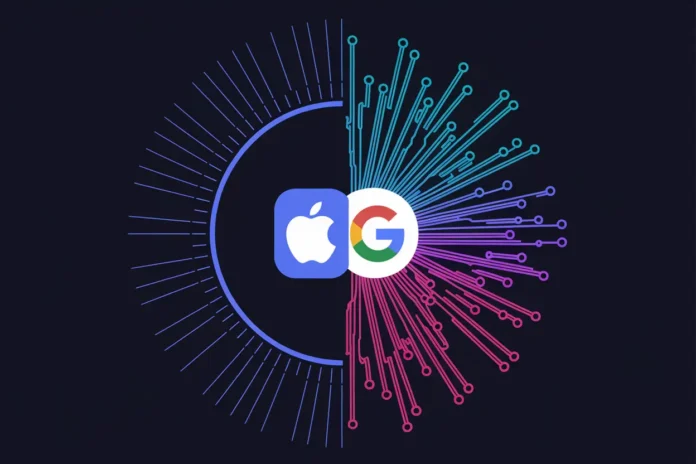Siri-Gemini Integration is poised to revolutionize how millions of Apple users interact with their devices. With Apple’s decision to integrate Google’s cutting-edge AI model, Gemini, into Siri, the voice assistant is on the brink of a major transformation. This integration promises smarter responses, enhanced contextual understanding, and superior task handling while retaining Apple’s strongest pillar — user privacy.
What is the Siri-Gemini Integration?
The Siri-Gemini Integration refers to Apple’s strategic collaboration with Google to embed the Gemini large language model (LLM) into Siri. Designed as a tailored version of Google’s AI for Apple devices, the upgraded Siri will respond more intelligently to user queries, manage tasks more efficiently, and align with advanced AI conversational standards. With Gemini’s 1.2 trillion parameters, it significantly surpasses Apple’s native AI capabilities, elevating Siri’s overall performance.
How Siri-Gemini Integration Works
The backbone of the Siri-Gemini Integration lies in a custom-built model developed by Google, specifically for Apple. Apple will operate this adaptation of Gemini through its robust Private Cloud Compute infrastructure. This design ensures data privacy, a key Apple hallmark, while maximizing AI performance. Despite being backed by Google tech, user interactions and data are processed securely on Apple-run servers, preserving trust and minimizing data exposure risks.
Why Apple Chose Google’s Gemini Over In-House Models
Apple’s existing AI models fell short in matching the capabilities offered by Gemini. Rather than delaying its AI evolution, Apple opted to invest nearly $1 billion annually into Google’s solution. This decision accelerates Siri’s development while Apple continues to hone its own AI architecture, expected to debut around 2026. Siri-Gemini Integration thus serves as a bridge strategy to maintain competitive parity in AI voice assistants.
What Makes Gemini Unique in the Siri-Gemini Integration
- Large Language Models (LLM): Gemini’s scale and training allow it to understand natural language, intent, and context better than legacy models.
- Mixture-of-Experts Architecture: Unlike traditional models that engage all parameters simultaneously, Gemini selectively activates relevant ones, enabling resource-efficient yet powerful processing.
- Multi-Modal Capabilities: Gemini supports diverse inputs — text, image, and audio — making the Siri enhancement truly multi-dimensional.
Privacy and Security in the Siri-Gemini Integration
Apple’s use of Private Cloud Compute ensures that Gemini operates on Apple-owned equipment within tightly controlled frameworks. No user data needs to be shared with Google. This architecture honors Apple’s strict stance on privacy while allowing users to enjoy advanced AI-powered features without compromising their personal information.
Pros and Cons of Siri-Gemini Integration
Pros:
- Enhanced Processing: Capable of handling complex, layered voice commands.
- Improved Conversations: Greater contextual awareness leading to natural dialogues.
- Flexible Capabilities: Applications in smart homes, search, productivity, and more.
- Data Protection: Maintains high benchmarks of data privacy and security.
Cons:
- High Cost: The $1 billion annual commitment could affect Apple’s ROI in other AI projects.
- Reliance on External Vendor: Potential limitation on Apple’s control over core AI functionalities for now.
Use Cases of Siri-Gemini Integration
Siri gets upgraded not just intellectually but functionally:
- Advanced Web Search: Siri can answer complex queries directly with synthesized responses, minimizing redirection to browsers.
- Smart Homes: Improved understanding of user preferences results in smarter automation and intuitive integration with HomeKit devices.
- Contextual Awareness: Whether scheduling meetings, sending reminders, or playing personalized playlists, Siri will understand more nuanced requests.
Latest Trends Influencing the Siri-Gemini Integration
The voice assistant ecosystem is witnessing a massive upgrade wave:
- AI-first Strategy: All major tech firms are embedding foundational AI models into services.
- Private AI Compute: Ensuring real-time processing of data while maintaining safeguards is becoming a standard.
- Multilingual and Multimodal Development: Assistants like Siri are evolving to understand not just languages but cultures and contexts.
Developer Opportunities in the Siri-Gemini Integration Era
For developers and app creators, the new Siri opens numerous monetization and innovation channels:
- Use SiriKit: Integrate apps more deeply into Siri’s AI core for task automation through voice.
- Focus on Contextual Workflows: Apps can now provide smarter services, dynamically triggered by user behaviors and conversations.
- Prioritize Privacy: All use cases must adhere to Apple’s data-handling policies to maintain ecosystem integrity.
Comparing Siri-Gemini Integration With Competitors
| Voice Assistant | AI Model | Privacy | Integration Quality |
|---|---|---|---|
| Siri (Gemini) | Google Gemini (customized) | High (Apple-owned infrastructure) | Native Apple ecosystem optimization |
| Alexa | Amazon custom LLMs | Moderate | Extensive 3rd party integration |
| Google Assistant | Gemini (full version) | Moderate | Tight Google service linkage |
Siri-Gemini Integration Impact on User Experience
The upgraded Siri becomes more conversational, proactive, and capable. Users give fewer commands and receive richer outputs. From answering complex trivia and assisting with mental wellness to drafting detailed emails, the great shift lies in how naturally Siri can operate across Apple’s device lineup.
Challenges in Adopting Siri-Gemini Integration
- User Trust: Combating skepticism about Google’s involvement despite Apple’s commitment to data security.
- Developer Alignment: Ensuring apps adapt their voice interaction models to leverage new AI capabilities.
- Transition Period: Overhauling legacy processes within Siri may yield temporary inconsistencies.
Real-World Scenarios Benefiting from Siri-Gemini Integration

Picture a user juggling calendar events, controlling a smart thermostat, and composing an email verbally. The Siri enhanced with Gemini handles it all effortlessly through contextual tracking and multitasking, showcasing the power of hybrid AI systems integrated with stellar user experience design.
The Future of Siri Post-Gemini Integration
While Siri-Gemini Integration sets new standards, Apple is not stopping there. Its internal teams are allegedly developing a 1 trillion parameter language model built for iCloud-based inference. This AI is set to debut by 2026, possibly giving Apple back full control over its voice assistant’s intelligence while maintaining compatibility with ecosystem standards.
FAQs about Siri-Gemini Integration
What is Gemini in the context of Siri?
Gemini is Google’s large language model used to enhance Siri’s capabilities. Apple is integrating a custom version designed for secure usage.
Will my personal data be sent to Google?
No. All data involved in the Siri-Gemini Integration is processed on Apple’s Private Cloud Compute infrastructure, ensuring full privacy.
How much is Apple paying for this technology?
Apple is reportedly investing around $1 billion per year to license and customize the Gemini model for Siri-specific use.
Will this upgrade be available on all Apple devices?
The initial rollout is expected to cover newer iPhones, iPads, and Macs starting in 2025, with compatibility expanding gradually.
How does this compare to native Apple AI development?
The Gemini integration is considered a placeholder until Apple’s own AI solution is mature enough for public deployment.
Conclusion: The Significance of Siri-Gemini Integration
Incorporating Google’s Gemini AI into Siri represents a landmark evolution in the voice assistant landscape. The Siri-Gemini Integration balances cutting-edge performance with Apple’s dedication to privacy and ecosystem synergy. As AI becomes the core of digital interaction, this strategic move assures Apple users of an intelligent, secure, and future-ready assistant experience.



